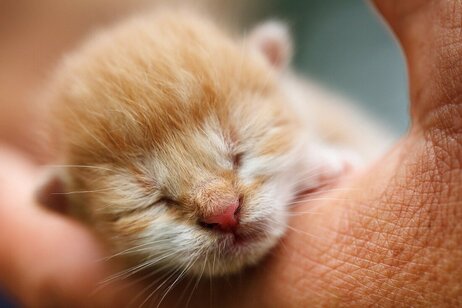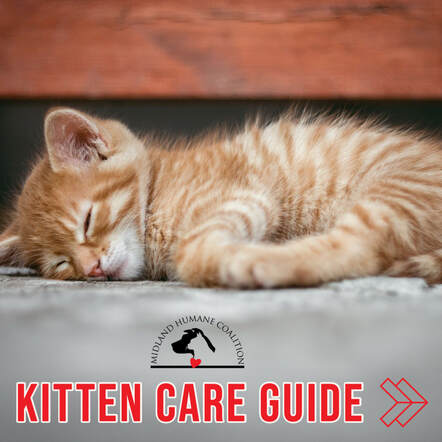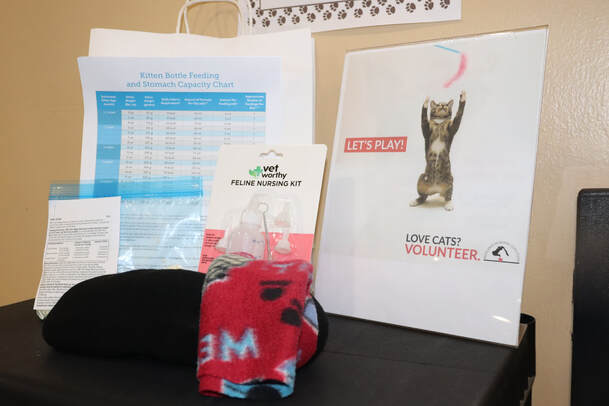Caring for Kittens

Springtime is also Kitten Season! During this time of year, there is an overabundance of kittens being born. As delightful as that may sound, the reality is quite the opposite for kittens born homeless, abandoned or orphaned as newborns since the chances for their survival are slim without human intervention.
What is Kitten Season?
"Kitten Season" is the time of the year when animal shelters become overrun with kittens. It starts with a few litters showing up in spring, but by summer they are pouring in. This is due to cats not being spayed or neutered. The numbers of kittens during Kitten Season can be so great that it becomes an immediate challenge for shelter staff and rescue volunteers to care for the ones who are actually brought in for care. Many are not and this over-population cycle continues. Long-term outcome—more homeless animals!
How does this happen?
Many unaltered female cats come into heat as young as 4 months of age. They start breeding when it starts getting warmer and give birth around spring. Cats can continue to breed, and unaltered female cats often have one litter after another, between March to October, just before the cold weather arrives.
What can I do to help kittens?
Make sure your pet cat(s) are spayed or neutered to prevent unplanned pregnancies.
Your veterinarian can guide you on what is involved including the cost for spaying or neutering your cat. Our community is lucky to have low cost spay and neuter clinics which operate on a very regular basis. We can get you in touch with them and also share information about the City and County Voucher Programs to assist with associated costs. Learn about Spaying/Neutering and voucher programs here.
Participate in your community’s trap-neuter-return program for feral cats.
A feral cat is an un-owned domestic cat that lives outdoors in colonies and often remains hidden from humans. Feral cats may breed over dozens of generations. One way to stop this cycle is to participate in trapping, neutering and returning these feral cats. The Trap–neuter–return (TNR) method, also known as trap–neuter–release, is a way to humanely and effectively manage the population of free-roaming domestic cats. The process involves live-trapping the cats, having them spayed or neutered, ear-tipped for identification and, if possible, vaccinated, then releasing them back into their territory. In Midland, there are active TNR efforts by volunteers in our community. Learn more about TNR here.
Volunteer.
We can always use an extra set of hands at the Adoption Center. There are numerous jobs to be done for many skill levels and capabilities and the rewards are many. Just ask how you can help this kitten season. Learn how to volunteer here.
Foster kittens.
Fostering saves lives. Pulling animals from the streets or the shelter where they are in danger of being euthanized and giving them safe shelter helps buy cats/kittens time while waiting for kennel space to open up at the Adoption Center and other no-kill rescues who will take cats and put them up for adoption. Learn about fostering and how to apply here.
For Kitten Season specifically, we are looking for foster homes who are able to commit 2-4 months (slightly longer than the usual foster term). During this period, kittens will be fully vetted (vaccinated, spayed/neutered) before they can be admitted into the Adoption Center. If you are interested in fostering, please fill out the Cat Foster Application Form.
Donate.
If you can't go out there and rescue kittens yourself, you can support the cause through financial donation. Any amount will be appreciated and is tax deductible. Donate here.
I found a litter of newborn kittens. What do I do?
First things first, leave them alone. Do not move them from that location until you know for sure that they are without a mother. They may have a mother who has temporarily left them to hunt for food and water for herself. If she is alive and well, she will return to care for her babies and she is their best chance of survival. The best thing you can do is observe them to see whether or not the litter has truly been orphaned or abandoned by their mom. If you take the kittens , they will have no chance of survival without human intervention. Wait to see if the mother is around and check to see if she might need help, too.
These kittens definitely need help.
How do I take care of orphaned/abandoned kittens?
How do I take care of orphaned/abandoned kittens?
|
Taking care of newborn kittens that were abandoned/orphaned takes a considerable amount of energy and weeks of constant care for them to have a good chance at survival. If their mother isn't around, they will rely on you to survive. Although it is a demanding feat, the rewards are immeasurable! You will possibly be saving precious little lives. Thank you for doing lifesaving work! Check out our Kitten Care Guide for some helpful tips. If you have questions, need additional guidance about caring for kittens, or are experiencing issues, please contact your veterinarian for help. |
What would I need to take care of kittens?
Kitten Care KitsWhen you decide to help kittens, here are some of the basic necessities. It's best to be prepared and have these items on hand. Must-haves:
Learn about more useful items for hand-raising kittens in our Kitten Care Guide |
For emergency situations, we've put together Kitten Care Kits so we're always ready to help kittens in need.
How old are these kittens?
The best way to determine the age of a kitten is to take it to a veterinarian for an assessment. Until you can take them in, you may need to estimate their age:
Consider the following signs:
- Newborn to 2 Weeks old - The kitten's eyes are closed until day 10. The ears are folded over. The kitten doesn't walk; instead, he crawls and wriggles.
- 2 Weeks to 3 Weeks old - The kitten's eyes are open, but his ears are still folded over. The kitten is starting to walk, but he's unsteady and wobbly.
- 3 Weeks to 4 Weeks old - The kitten can walk well; he's no longer wobbly. His ears are unfolding into an erect position. He's beginning to experiment with soft solid foods during week 4.
- 4 Weeks to 5 Weeks old - Some kittens begin learning how to run during the latter part of week 5 and nearly all run by the end of week 6.
I've never raised kittens before. How do I know what to expect?
KITTEN MILESTONES
Day 1: a kitten should weigh 2 to 4 ounces.
Day 7: it should double in body weight.
Day 8: The kitten should open its eyes. The eyes will stay blue for about 2 more weeks. (The true eye color will not appear until the kitten is about 3 months old.)
Week 2: The ears will start to stand up.
Week 3: The kitten will try to walk.
Week 4: The kitten will start to play with littermates and develop teeth.
Week 6: Most veterinarians will give the first shot at 6 weeks old. Check with your veterinarian as to the timing of the needed vaccinations.
Week 8: The kitten should be ready for adoption at 8 weeks, and should be spayed or neutered at that time.



